In the European energy mix, wind is one of the most important sources of renewable energy. But the expansion of onshore wind power plants is reaching its limits. Only a few sites are still available. Offshore wind farms are therefore becoming increasingly important. In particular, floating wind farms that can harvest the vast wind resources far out at sea in deeper waters are therefore coming into focus to ensure the continued growth of the industry. But the technology is not yet mature. The EU is now funding the Horizon 2020 project “FLOATECH” with four million euros over three years.
The aim is to use the combined expertise of nine European research and industry partners to bring the environmentally friendly technology of these plants to maturity and to increase cost efficiency. The project is coordinated by the Department of Experimental Fluid Mechanics at TU Berlin.
“The use of wind energy is of crucial importance for many of the next environmental and energy policy goals. Europe is a leader in this technology and has developed its wind energy sector into an important industry with hundreds of thousands of jobs.”
- Dr.-Ing. Christian Navid Nayeri, Project Manager at TU Berlin
Aerodynamic design and intelligent control in wave conditions
In order to be able to optimize the design of the turbines and thus increase their economic efficiency, the industrial-grade design tool “QBlade-Ocean” is first being developed and experimentally validated. It simulates the complex interactions between aerodynamics, hydrodynamics, mechanics and control of floating offshore wind turbines with unprecedented efficiency and accuracy.
A second goal is the development of innovative control methods to make optimum use of waves and platform movements (“Active Wave-based Feed-Forward Control” and “Active Wake Mixing”). This should lead to a reduction of the wake effect, the turbulent wind tail in the slipstream of the blades, and thus to a net increase in the annual energy production of floating wind farms.
No piles in the seabed — protecting wildlife
The environment and biodiversity will also benefit from the targeted design optimization. Less material and space will be used and there will be no noise as no piles need to be anchored in the seabed, wildlife habitat will be protected.
“I expect FLOATECH to contribute to the advancement of floating offshore wind energy technology by creating a deeper knowledge base,” said Christian Nayeri. “The project will also train many engineer*s with state-of-the-art floating wind expertise. By involving relevant stakeholders, the results of the project can then be fed directly into the market. All in all, the project is a great opportunity to strengthen the leading position of European wind energy technology and to further establish TU Berlin as a competence leader in this field.”

















